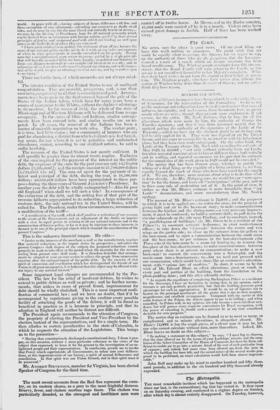BUCKING:IAM HOUSE.
S EVERAT. additional documents I ',tee been printed, by order of ti I a I To eee of Commons, for the inf,neeati on of the Committee. So tie- a, tile public contempt and indignetiou have been-din:TIM agebist that nine; of ugliness, incongruity, and uselessness, these documents kayo its pretty nearly \ VII are we were ; though they present some explanaticin, if not excuse, for the :mist. Mr. Nash dee:litres, that he has, for all the alterations which were inede by him, the authority of George the Fourth's signature ; and thet it was from ignorance merely that he omitted getting the authority of the signatures of the Lords of the
Treasury,—whieli we have not the sli,elitest doulit lie mielit have got, had lie only :Tidied for it. They were too dependent on the King's favour, and too eager to monopolize it, to interfere with his lialiy-lemee
plane, had they been even neme extravagant. On the other hand, the Lords of the Treasury charge Mr. Nash with exceeding thc estimate of -May 1829, by 40,0001. ; " not only without authority from my Lords, but after repeated warnings given to him at different tunas, both verbally and in writing, and repeated assurances on his part that his estimate for the completion of the evork given in 1829 would not be exceeded." The money that has been thrown away, whetlit r to gratify the As-bill-1i: of a dead King, or the cupidity of a living architect, is, We fear,
equally beyond the reach of those who here been texed for the supply
of it. We are, therefore, more anxious about what is to do than what IS done alreedy. As Mrs. Nalaprop says, we would let our " retrospec-
tion" be for the future, and leave all " tuiticipati one" tithe past, unless to draw sonic rule of moderation out of it. In tide point of view, it strikes its that Mr. Blore's estimate is more formidable than " my Lords' " denunciations, and more unsatisfactory than Mr. Nash's apology.
The amount of Mr. Blore's estimate is 74,0001. ; and the purposes to which it is to be applied are—to widen the areas, for the purpose of giving light and air to the basement story; to make communications between the kitchen and the dining-room,--a very necessary improve- ment, it must be confessed ; to build a servants'-hall ; to pull down the circular colonnade on the side next Pimlico; and to construct, instead,
"a parallelogram of buildings," (is Mr. Owen to be a resident of the Pnlace ?); to construct servants' bedrooms; to erect confectionery offices ; to take down the " intervals" between the centre and two
wings 011 the garden side; to close up the entrance from the gallery to the bow-room, and to open a communication between the south room
and the bow-room; to put columns in the bow-drawingroom (the.
Times asks if the bow-room be a room for bowing ; to remove the fire-place of the bow-drawingroom ; to make communications between parts where there is at present no communication ; to make a new back-stair! to convert the conservatory into a flower-plot, and the music-room into a drawingroom ; to—but we need not proceed with our enumeration, which would best close, like an auctioneer's advertise- ment, with "various lots of sundries." In short, it seems to be the wish of Mr. Edward Blore to effect alterations, great or small, in every part and portion of the building, from the foundation to the plum-pudding dome; and this after solemnly stating- " As regards the expediency of completing Bueleingliam Palace as a residence for the Sovereign, I have no hesitation in stating that, in my opinion, such a
measure is not only perfectly practicable, but that the building possesse.s great advantages for such an appropriation. It would be an act of injustice not to bestow on the principal apartments all the praise that is due to their number, magnificence, and excellent arrangement. Compared with the merits of this noble feature of the Palace, the defects appear to time to be trifling ; and when remedied, the Palace will, in my opinion, not only become a most excellent resi- dence, but will possess every requisite convenience for Royal occupation, with the power of extending it, should such a measure be at any time considered desirable for state purposes."
The notion that an estimate can be framed so as to meet so many, so complicated, and so minute alterations, is altogether absurd. -Mr. Blore's 74,000/. is but the rough guess, of a clever man it may be, but one who cannot calculate without data, more than others. Indeed, Mr. Blore leaves no doubt on this subject- " In making a statement on this subject," he says, "I must beg to observe, that the time allowed me by the terms of your Lordships' minute, and the reso-
lution of the Select Committee of the House of Commons, has been far from suf- ficient to enable me to go into a minute detail of the cost of each particular itemn of expense; and, indeed, had more time been allowed me, from the state in which the building has been left, and the mixed nature of the several works pro- . posed to be performed, an exact calculation would bade been almost impracti- cable."
John Bull may make up his mind to another hundred and fifty thou- sand pounds, in addition to the six hundred and fifty thousand already expended.


















































 Previous page
Previous page